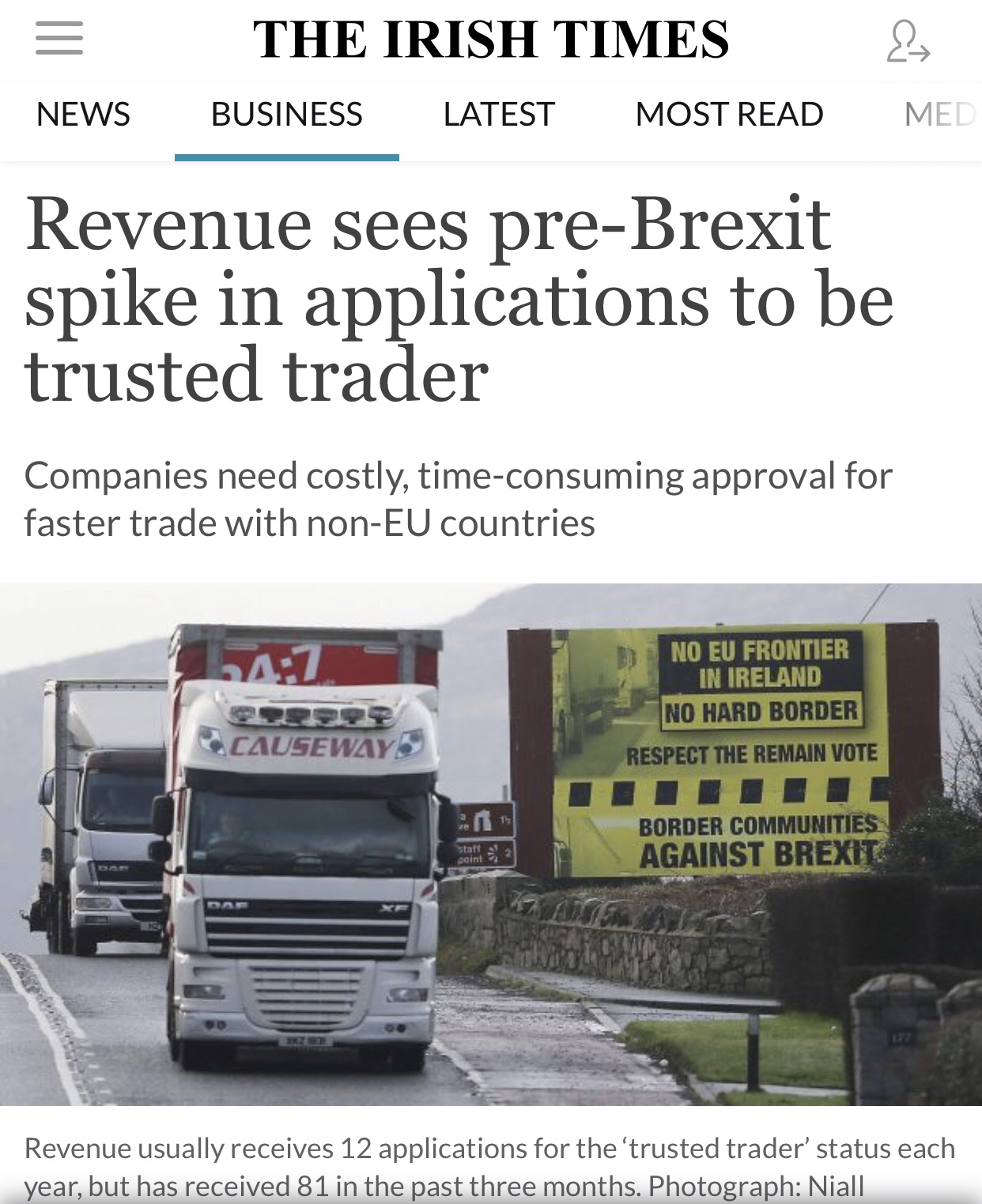Revenue sees pre-Brexit spike in applications to be trusted trader
The number of businesses seeking a type of “trusted trader” status for faster border and customs checks in post-Brexit trade with the UK has surged, figures from Revenue show.
The tax authority said that it had received 80 applications from companies seeking approval for Authorised Economic Operator (AEO) status over the last three months.
The number of applications for this status, which allows companies to expedite the import and export of goods and avoid costly delays at ports and airports, has risen as the date of the UK’s exit from the EU has moved closer.
There were 61 applications received in 2018 with almost 80 per cent being received in the last six weeks of the year as the political uncertainty grew around the timing and manner of the UK’s exit from the EU.
Checks have been made on 31 of the recent 80 applicationsreceived between mid-November 2018 and February 11th and are being assessed by the Revenue’s control officers for assessment.
The remaining 49 applications are being examined by Revenue’s AEO unit before they are formally accepted.

An average of 12 applications a year for AEO status were received by Revenue between 2015 and 2017. To date, Ireland has granted the internationally recognised status to 157 trading companies.
Revenue says the increase coincides with significantly more focus on Brexit in its recent “outreach” seminars with traders as it encourages companies to be prepared for dealing with the UK as a non-EU country.
In another sign of businesses getting Brexit-ready, the number of companies applying for customs registration numbers – known as Economic Operators Registration and Identification (EORI) – in the first half of this month reached 1,378, more than three times the number that applied last month.
Companies require an EORI number to be able to trade with a “third country” which the UK is due to become at 11pm on March 29th.
Applying for AEO status can be a costly and time-consuming exercise, taking an average of four to six months to secure, and may not be suitable for all cross-border traders.
Gerry Harrahill, one of the Revenue commissioners, told an Oireachtas committee last month that for some businesses AEO status may be “a poor investment of time, money and expertise because the potential payback could be extraordinarily limited”.
Firms moving food or traders in the agricultural sector moving livestock would not benefit from AEO status as it offers no fast-track through food safety and sanitary and phytosanitary (SPS) – animal and plant health – checks.
“In keeping with Revenue’s role and responsibilities, we are strongly focused on facilitating the efficient and timely movement of goods in compliance with customs controls post-Brexit,” said a Revenue spokesman.
“We will continue to work to support trade and businesses in order to maintain high levels of voluntary compliance.”
My comment: It is important to know that this article is referring to the present version of the EU AEO programme, a legacy system implemented in 2008. The global standard itself, from the World Customs Organization (SAFE) allows more facilitation and different ways of applying the AEO concept. Many countries have the last 5-6 years designed, developed and implemented more modern versions of AEO (normally named Trusted Trader Programes) with lower thresholds – and thus costs – to get into the programme and considerbly more benefits for thise who qualify for the certification. The new EU Union Customs Code (UCC) allows EU to update its AEO and the process has started. UK are post-Brexit free to implement a more modern AEO programme, woth different toers meeting requirments of traders amd offering considerbly more beneofts to business, while still meeting the demands of the international standards making it possible to sign Mutual Recognition agreements with EU and other countries.
You can read the article here: Revenue sees pre-Brexit spike in applications to be trusted trader
Source: Irish Times
You must be logged in to post a comment.